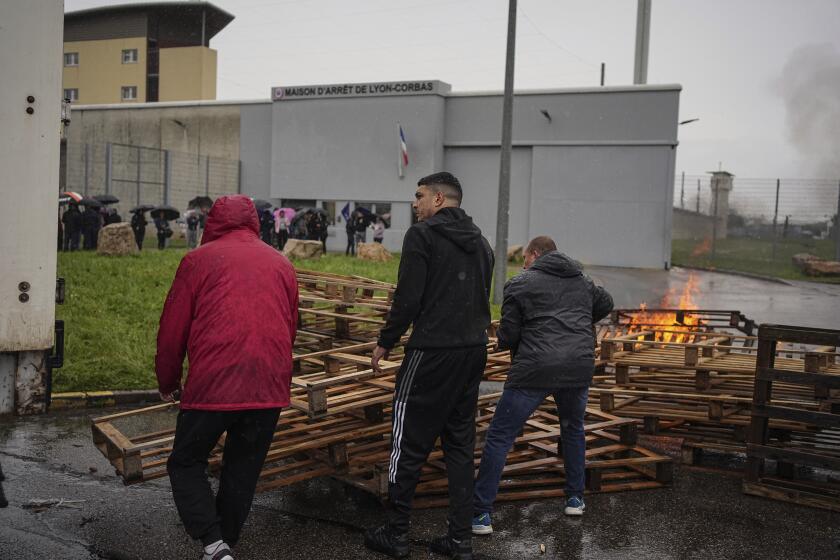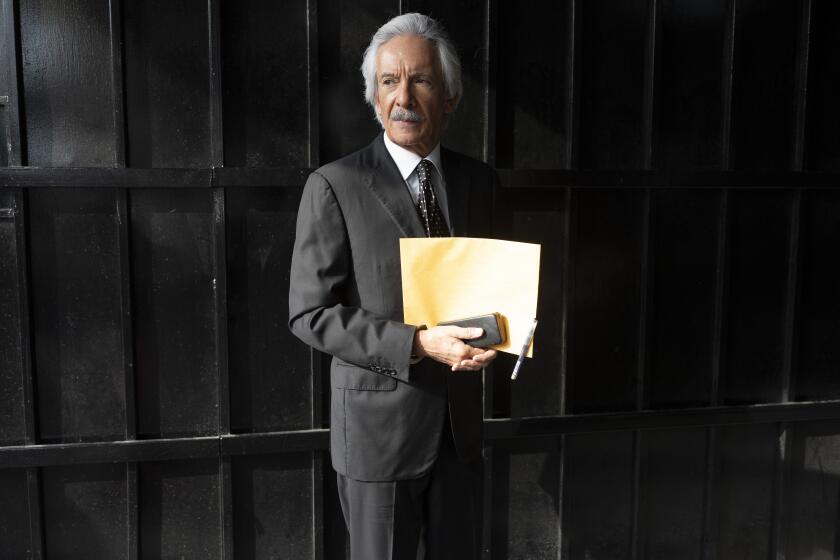U.N. Working on Plan to Allow Iraq to Sell Oil : Sanctions: The deal would raise more than $1 billion. The panel says proceeds must go for humanitarian relief and postwar costs.
The U.N. Sanctions Committee is moving toward allowing Iraq to sell oil for the first time since sanctions were imposed after President Saddam Hussein’s forces invaded Kuwait last August.
Diplomats said Sunday that Western allies are close to an informal agreement to permit a sale of more than $1 billion in oil, provided adequate safeguards are put in place so that revenues from the onetime transaction will be used for humanitarian relief in Iraq and not just funneled to Hussein’s supporters.
“We do not want to hurt the Iraqi people. We want to see the Iraqi people helped,” said a U.S. official aware of delicate discussions taking place as the Sanctions Committee meets at U.N. headquarters today. “A mechanism should be set up to help the Iraqi people.”
A Western diplomat monitoring the talks said the most difficult remaining task is to create the monitoring mechanism to ensure proper distribution of revenues from the sale.
Under plans being discussed, Iraq would be forced to use part of the proceeds to pay for the elimination of some of its weapons of mass destruction. In addition, part of the profits from the oil sale would be earmarked to pay half the cost of the U.N. commission seeking to demarcate the long-disputed boundary between Iraq and Kuwait and for part of the costs associated with returning property stolen from Kuwait by Iraq.
Part of the oil sale proceeds--close to 30%--would be put into a special compensation fund to pay nations, corporations and individuals that suffered damage by Iraq after the invasion, according to the plans being considered. The United States had lobbied for Iraq to pay as much as 50% of its oil revenues to Gulf War victims.
Prince Sadruddin Aga Khan, the head of the U.N. interagency humanitarian program in Iraq, is expected to stress an urgent need for relief funds from the onetime oil sale when he meets with the 15-member Sanctions Committee today.
According to a report prepared by the prince after a recent mission to Baghdad, Iraq’s oil production capacity is 1.45 million barrels a day. After satisfying domestic needs, Iraq could export about 1 million barrels a day--a third of the prewar level. This would mean potential net revenue of about $5.5 billion a year, the prince estimated.
He suggested that officials of the United Nations and other humanitarian agencies in Iraq, as well as special missions delegated by U.N. Secretary General Javier Perez de Cuellar, submit periodic assessments of progress made by Baghdad to improve humanitarian conditions after any oil sale.
“The envisioned procedure would thus help to ensure the actual receipt of the civilian and humanitarian goods in Iraq and their utilization by the intended beneficiaries,” Prince Sadruddin said.
He said a monitoring system could scrutinize transactions relating to the export of the oil and the importing of foodstuffs, sanitation equipment and other badly needed humanitarian supplies. The monitoring system could be strengthened, he added, to “provide adequate information on the destination and use of the goods in question.”
The prince’s July 15 report to Perez de Cuellar on the results of his mission stressed the hardships ordinary citizens in Iraq face in the aftermath of the war. He said Iraq faces “the gradual but inexorable collapse of essential services leading to the risk of a humanitarian crisis whose eventual dimensions would dwarf today’s difficulties.”
“Our aim has been to be sober, measured and accurate,” the report to the secretary general stressed. “We are neither crying wolf nor playing politics. But it is evident that for large numbers of the people of Iraq, every passing month brings them closer to the brink of calamity.
“As usual, it is the poor, the children, the widowed and the elderly, the most vulnerable amongst the population, who are the first to suffer. This cannot leave us unconcerned.”
The U.N. report noted that the extensive damage Iraq suffered during the Gulf War came after eight years of war with Iran. It said that U.N. sanctions, including the freezing of Iraq’s foreign assets and the ban on the international sale of its oil, had major consequences on Iraq’s economy.
And it predicted “a widespread and acute food supply crisis, which if not averted through timely intervention, will gradually but inexorably cause massive starvation throughout the country.”
The prince and other U.N. officials believe that the financial requirements needed to provide the humanitarian assistance are well beyond what is likely to be available under present U.N. programs, which have collected only $210 million. Most of these funds have already been pledged for the needs of refugees.
Almost immediately after Iraq’s invasion of Kuwait last Aug. 2, sanctions were put in place by the Security Council. And after the war’s end, in the view of U.S. diplomats at the United Nations, the threat of continuing sanctions has served as an important lever to pressure Hussein to comply with resolutions requiring the elimination of Iraq’s weapons of mass destruction and nuclear weapons materials.
In recent days, U.N. disarmament experts have told the Security Council’s five permanent members--the United States, Britain, France, China and the Soviet Union--that Iraq has shown greater cooperation in explaining disclosures it has already made about its nuclear program. But these experts stress that much more information is needed.
In this context, the Bush Administration has been wary of permitting an oil sale by Iraq unless there are safeguards to ensure that humanitarian needs truly are served.
On Friday, Richard Boucher, a State Department spokesman, made that clear, warning of the danger of “maldistribution.”
“It’s important that whatever is done to assist the Iraqis, given their records of diversion, given their records of manipulation, whatever is done to assist them has to be done under strict monitoring to ensure that the government is not able to manipulate the food shipments and keep them from the people who really need it,” Boucher said.
More to Read
Start your day right
Sign up for Essential California for news, features and recommendations from the L.A. Times and beyond in your inbox six days a week.
You may occasionally receive promotional content from the Los Angeles Times.






